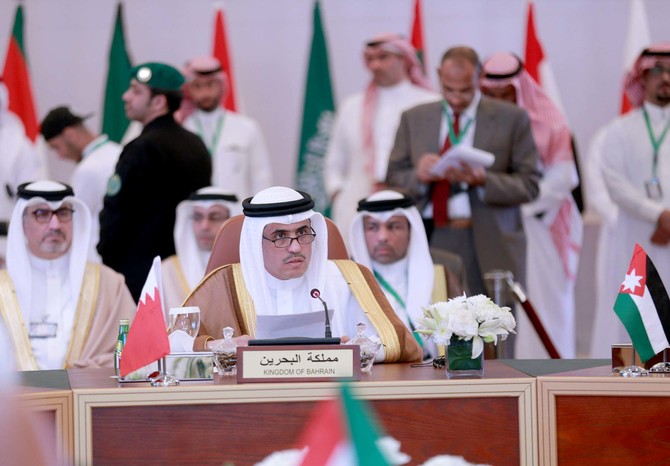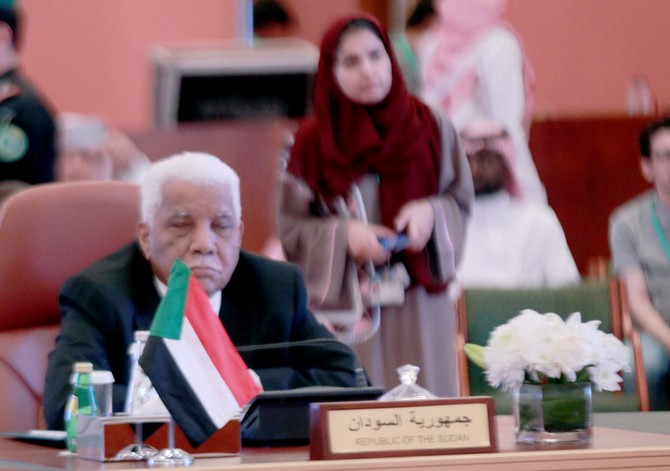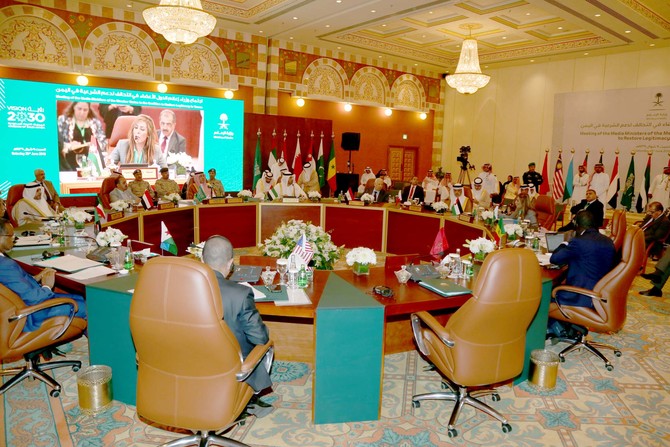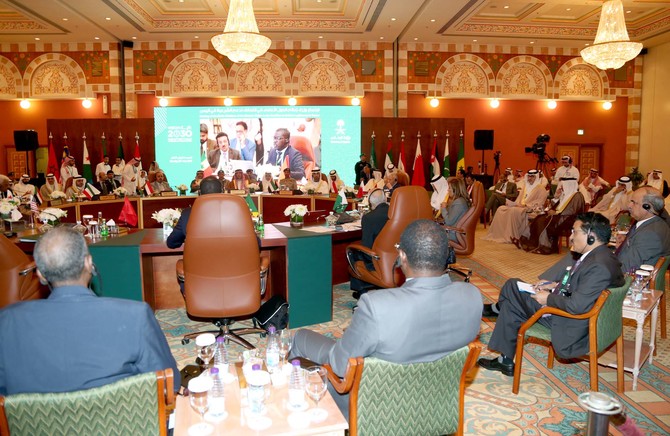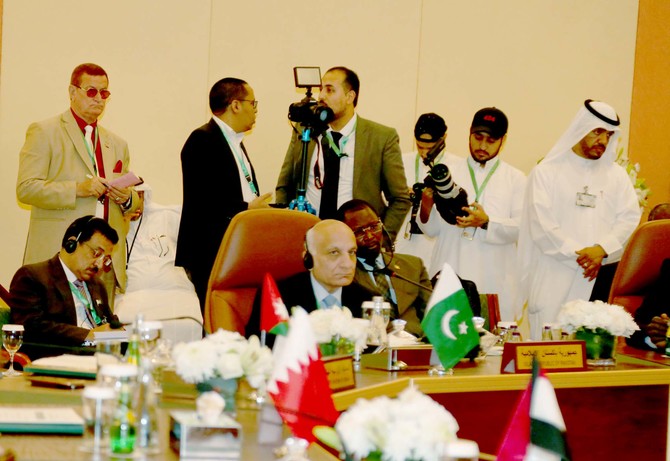JEDDAH: Media ministers for member states of the coalition for supporting legitimacy in Yemen held their fourth meeting on Saturday to discuss the ways of coordinating efforts and providing media support for coalition countries.
Saudi Minister of Information Awwad Al-Awwad said: “Houthi militias are one of the tools of Iran to threaten the stability of the region, and their ambitions have not stopped at attacking Yemenis and seizing their lands, but they exceeded that to threaten the security of Saudi Arabia by launching more than 152 ballistic missiles intercepted by our air defense forces and prevented from reaching their targets.”
He added: “The coalition has managed to restore and liberate more than 85 percent of the Yemeni territory with its full commitment to the rules of engagement and the protection of civilians and support of the Yemeni people and its legitimate government in resisting the enemy.”
Al-Awwad pointed out that the coalition’s support has not been limited to military operations, but has extended to other economic, security, relief and service aspects, infrastructure development projects, paving roads, rehabilitating ports and increasing their capacity.
Al-Awwad told Arab News that the meeting highlighted the blatant interference of Iran in the region, especially in Yemen, through its support for the Houthi militias.
“Some news agencies transmit news that may not be authenticated,” he said. “We want to tell them that there are reliable sources… that can be consulted. Therefore, news agencies were told to coordinate and publication shall be consolidated.”
He continued: “You are aware of what media stations hostile to the coalition countries and the legitimate government in Yemen are doing to falsify, deceive, fabricate stories, propagate rumors, broadcast distorted information, influence minds and emotions, and downgrade Yemeni army and coalition force success in diplomatic and various fields.
Yemeni Information Minister Muammar Al-Iryani said: “The Houthis will not go to peace until their military stalemate is broken and we have no choice but to cut (off) Iran’s arm in Yemen.
“More than 13,000 journalists were kidnapped by the Houthis and we are demanding the international community seek their release.
Pakistan’s Ministry of Information Additional Secretary Shafqat Jaleel said: “Pakistan calls for unconditional restoration of the legitimate government of President Abd-Rabbu Mansour Hadi and withdrawal of rebel forces from the territories seized by them, including the capital Sanaa.
“Pakistan contributed $1 million in humanitarian aid to Yemen last year and welcomes the Saudi initiative of providing relief to war victims in Yemen. Pakistan supports all efforts for peace in Yemen and calls for a political settlement, which can ensure lasting peace in the country,” he added.
Sultan bin Ahmed Al-Jaber, chairman of the National Media Council of the UAE, said: “The restoration of the legitimate government … enhances the chances of reaching a peaceful solution and puts pressure on the Houthi militias to sit at the negotiating table and break the deadlock in the political process.”
Bahraini Information Minister Ali bin Mohammed Al-Rumaihi stressed that “the security and stability of our Arab region, our identity, our unity and the sovereignty of our country, impose on all our media moral, professional and national responsibilities as a basic weapon and a strategic partner with our armed forces in the face of extremist terrorist organizations and blatant external interference.”
The conference was represented by media ministers from Saudi Arabia, the UAE, Sudan, Egypt, Kuwait, Bahrain, Jordan, Djibouti, Malaysia, Senegal, Yemen and Pakistan.
Ministers discuss winning media war in fight for Yemen’s legitimacy
Ministers discuss winning media war in fight for Yemen’s legitimacy

- More than 13 journalists were kidnapped by the Houthis and we are demanding the international community seek their release
- The coalition has managed to restore and liberate more than 85 percent of the Yemeni territory
Saudi Arabia welcomes US-brokered peace agreement between Rwanda and DR Congo

- Saudi Ministry of Foreign Affairs: Kingdom hopes accord would meet “the hopes and aspirations of two peoples for development and prosperity”
RIYADH: Saudi Arabia has welcomed the signing of a peace agreement between Rwanda and the Democratic Republic of the Congo, in a deal facilitated by the United States with support from Qatar, the Saudi Press Agency reported.
In a statement issued on Saturday, the Saudi Ministry of Foreign Affairs said the Kingdom hoped the accord would meet “the hopes and aspirations of the two peoples for development and prosperity,” and contribute to “regional and international security and peace.”
The ministry also praised “the diplomatic efforts and constructive role played by the United States of America and the State of Qatar in this regard.”
The agreement, finalized on Friday, aims to de-escalate long-running tensions between Rwanda and the DRC, which have intensified in recent years over accusations of mutual support for armed rebel groups operating along their shared border.
The most prominent of these is the M23 militia, which Kinshasa has accused Rwanda of backing — a charge Kigali denies.
Efforts to mediate between the two neighbours have gained urgency amid a worsening humanitarian crisis in eastern DRC, where conflict has displaced more than seven million people.
The US and Qatar have played key roles in recent months in bringing the two sides to the table for talks, culminating in the formal agreement to ease hostilities and commit to renewed dialogue.
Jeddah exhibition gives internet cafes an artistic reboot

- Local artists revive communal, quirky, deeply human qualities of early web era
JEDDAH: Internet cafes in Jeddah were once popular spots with pay-by-the-hour internet access; they have now provided the inspiration for the city’s latest exhibition.
In a collaboration between Kham Space and Estiraha, 17 artists and collectives have had their work on display at “Internet Cafe,” an eight-day exhibition which explored the concept of connection and intimacy in the digital age.

Abeer Sultan, who curated the exhibition alongside Mbarak Madhi and Fai Ahmed, spoke to Arab News about the early process in contemplating the theme.
The idea for the exhibition, which concluded on Saturday, stemmed from an exasperation over incessant scrolling, and the deluge of information that has usurped our daily lives.
HIGHLIGHTS
• The idea for the Jeddah exhibition stemmed from an exasperation over incessant scrolling, and the deluge of information that has usurped our daily lives.
• Some of the works were meant to act as ‘hyperlinks’ to connect ideas, as well as creating a communal space and mimicking the social space of a cafe.
She said: “We wanted to do something that is about us now, and maybe the future as well; not only going back to things for nostalgia or the good old days, as they say.

“Maybe it has something that we can use today, especially now that there’s a movement of people trying to slow down, using dumbified devices throughout the internet.”
Instead of creating a literal internet cafe, the curators focused more on the nuances a cybercafe used to have.

Their approach to the space was categorized into three themes: “Disconnected Understanding, Linked Source,” “In the Shadow of a Doubt, Light My Screen,” and “Whirling Algorithms of a Distant Dream.”
Artist Zahiyah Alraddadi, who usually paints works focusing on the significance of the mundane, took oil to canvas to paint “Closed Eyes Under a Sunny Sky I” and “Familiar Features.”

Her work feels meditative and was intended to slow visitors down as they walked through the space — much like the feel of a buffering screen page.
Some of the works were meant to act as “hyperlinks” to connect ideas, as well as creating a communal space and mimicking the social space of a cafe.

Anhar Salem’s work “After Now” was a curtain imprinted with thumbnails of YouTube videos. The artist conducted a survey asking people between the ages of 18 and 40 to share their YouTube video recommendations, making up a curtain of information overload.
Next to that, Tara O‛Conal’s video installation was a film sequence — but the catch is, nothing really happened. The film continued to load, glitch, and reload, perhaps suggesting commentary on our constant yearning for contact.

“Compared to Anhar’s work, (Tara’s) feels like a pond, in a way, to look at,” Sultan said.
Some works were inspired by computer graphics. Asaad Badawi paid tribute to early programmer culture via telephone-book-inspired art, and his father, who is a programmer.

Studio bin Hattan, which is led by artist Elham Dawsari, displayed “Cultural Override,” derived from her father’s archives from the 1980s. Madhawi Al-Gwaiz paints in a style that echoes digital graphics from the early 2000s.
Others took a more distanced approach. ThirdSpace’s “Untitled Table” was a physical object, but the research behind it was about keyboards that then shifted to Hijazi architecture, drawing on the iconography and architectural languages across the history of the region.

Hayfa Al-Gwaiz’s “Long Distance” was a painted form of facetime video calls. The work explored digital intimacy by showcasing not the callers’ faces, but the ceilings above them — a scene that’s familiar to anyone who has taken up a long-winded video call with a loved one and set down the phone to cater to life’s more immediate demands.
While the exhibition tackled the digital boom personified through cybercafes, it notably avoided artificial intelligence.
Sultan explained: “It is the idea of being fast and efficient, which is what we are resisting with AI … It’s dominating the internet in a weird way, and we wanted a space where people customized things manually, going back to montadayat (domains) where people had to do things by themselves. There’s no template.”
The last piece was by Ahaad Alamoudi, and “Land of Dreams” took a humorous approach to directing audiences to their dreams. As you walked toward the work, in an outdoor area outside the confines of the exhibition space, visitors were met with vinyl boards of the iconic Emirati singer Ahlam.
Sultan said: “The work accentuates the fact that the dream land is a subjective experience or idea, and everyone would have their own imagination of what that is, whether it's Ahlam or something else.”
The “Internet Cafe” was a love letter to a new digital age — one that is sustainable, communal, and deliberately slow.
“This is our way of keeping in touch with other people. An exhibition space is also a space where people meet, even if it’s for a moment, to have these conversations together, which is really important,” Sultan said.
Rooted in earth: Rafha’s mud structures tell a story of sustainability

- The buildings were constructed using indigenous methods and natural materials including mud, stone, wood, and palm fronds
RIYADH: In the heart of northern Saudi Arabia, the mud buildings of Rafha stand as “a vibrant narrative of traditional architecture, reflecting authenticity, creativity, and cultural identity,” the Saudi Press Agency said in an article on Saturday.
These structures tell the story of an ancient past, “embodying traditional architectural ingenuity that connects people to the land.”

Located along one of the Kingdom’s most significant tourist routes, the buildings “integrate cultural heritage with the natural environment,” the SPA wrote, and “serve as living records of generational memory, preserved through architectural details.”
This makes them an appealing destination for anyone interested in history, heritage, and traditional craftsmanship.
FASTFACTS
• The buildings in Rafha were constructed using indigenous methods and natural materials including mud, stone, wood, and palm fronds.
• Local authorities are making efforts to restore and maintain these mud structures, preserving their historical and cultural value.
The buildings were constructed using indigenous methods and natural materials including mud, stone, wood, and palm fronds. Their design responds to the local environment, maintaining balanced indoor temperatures during scorching summers and cooler winters. Most feature an inner courtyard, surrounded by rooms arranged in a circular layout, reflecting a strong sense of community.

These mud buildings illustrate “a deep harmony between humans and their environment,” the SPA wrote, adding that they also “reflect sustainable building principles that long predate modern green architecture.”
Local authorities are making efforts to restore and maintain these mud structures, preserving their historical and cultural value while promoting them as distinct parts of the Saudi tourism landscape.
Malaysia grants Saudi Hajj minister Al-Rabiah 'Hijra Personality of the Year' award

- Tawfiq Al-Rabiah Al-Rabiah was presented with his award by Malaysian King Sultan Ibrahim
KUALA LUMPUR: Saudi Arabia’s Minister of Hajj and Umrah Tawfiq Al-Rabiah received the International Tokoh Ma’al Hijrah 2025 award in Malaysia on Friday, the Saudi Press Agency reported.
Malaysia grants the award — the name of which translates to Person of the Year for Hijrah — annually to an influential Muslim personality to recognize their contributions to Islamic causes.
Al-Rabiah won the award for his efforts in developing systems designed to make Hajj and Umrah run safely and smoothly for pilgrims.
Al-Rabiah was presented with his award by Malaysian King Sultan Ibrahim. Malaysian Prime Minister Anwar Ibrahim and Minister of Religious Affairs Mohammed Naeem bin Mukhtar were present at the ceremony.
The event was held in Kuala Lumpur on the occasion of Hijri New Year.
Muslim World League condemns Israeli attacks on civilians in Gaza, West Bank

- Organization describes actions as part of wider pattern of settler aggression
RIYADH: The Muslim World League on Saturday strongly condemned recent Israeli attacks on civilian shelters and ongoing violence against Palestinians in the Gaza Strip and the West Bank, the Saudi Press Agency reported.
The MWL has described the actions as part of a wider pattern of settler aggression carried out with impunity under the protection of the Israeli occupation forces, the SPA added.
The MWL’s Secretary-General Dr. Mohammed bin Abdulkarim Al-Issa, who also chairs the Organization of Muslim Scholars, denounced in a statement issued by the MWL’s General Secretariat what he called “heinous crimes” committed against unarmed civilians, including recent attacks by settlers on the village of Kafr Malik, east of Ramallah.
He added that the “brutal assaults” were a “blatant violation of all human values as well as international laws and norms.”
He urged the international community to uphold its legal and moral responsibilities and take decisive action against what he described as the occupation government’s ongoing disregard for the rights and dignity of the Palestinian people.
Al-Issa also called for the immediate activation of international mechanisms to halt the violence and ensure accountability for those responsible for what he termed “horrific massacres.”
His comments came after Saudi Arabia’s Foreign Ministry issued a statement on Friday condemning the violence, denouncing “the continued violence perpetrated by Israeli settlers, under the protection of the occupation forces, against Palestinian civilians, including the attacks in the village of Kafr Malik.”







